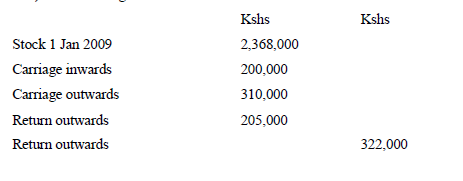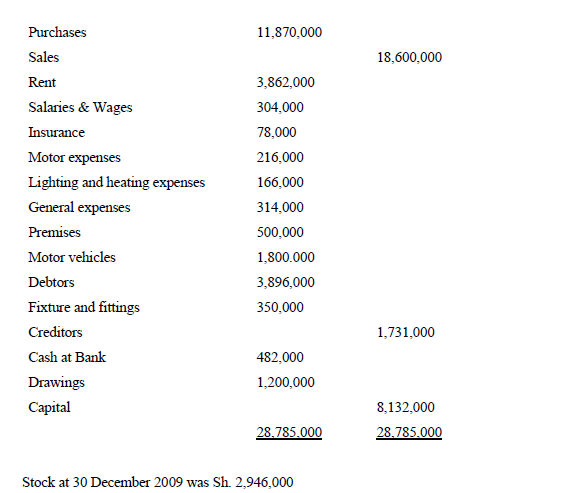When should sales revenue only be ‘realized’ and so ‘recognized’ in the trading, profit and loss account?(Solved)
When should sales revenue only be ‘realized’ and so ‘recognized’ in the trading, profit and loss account?
Date posted: February 28, 2019. Answers (1)
The following information was extracted from the book of LIMA Ltd. For the year 2006(Solved)
The following information was extracted from the book of LIMA Ltd. For the year 2006
(i) Initial capital as at 1/01/2006 – Sh.200,000
(ii) Made a net loss of Sh. 50,000
(iii) The proprietor invested into the business from her personal saving Sh. 600,000
(iv) The proprietor withdraw in cash for her personal use Sh. 250,000
Required:
Using the final capital formula, determine the final capital as at 31/12/06
Date posted: February 27, 2019. Answers (1)
Outline 4 circumstances under which the capital of a business may change(Solved)
Outline 4 circumstances under which the capital of a business may change
Date posted: February 27, 2019. Answers (1)
Define the following terms as used in Business.
(i) Business transactions
(ii) Credit transaction
(iii) Initial capital
(iv) Final capital
(v) Drawings(Solved)
Define the following terms as used in Business.
(i) Business transactions
(ii) Credit transaction
(iii) Initial capital
(iv) Final capital
(v) Drawings
Date posted: February 27, 2019. Answers (1)
The following transaction to Best Sales (K) Ltd for the month of March 2009.(Solved)
The following transaction to Best Sales (K) Ltd for the month of March 2009.
March 1: Started business with Sh. 800,000 in the bank.
March 2: Bought goods on credit from the following persons
Ndichu- Sh. 76,000
Omolo- Sh. 27,000
Tina- Sh. 56,000
March 5: Cash sales Sh. 87,000
March 6: Paid wages in cash Sh. 14,000
March 7: Sold goods on credits to
Emma-Sh.35, 000
Jane- Sh. 42,000
Juma- Sh. 72,000
March 9: Bought goods for cash Sh. 46,000
March 10: Bought goods on Credits from
Omolo- Sh. 57,000
Ndebu-Sh. 98,000
March 12: Paid wages in cash Sh.465, 000
March 13: Sold on credit to: Jane- Sh. 32,000
Juma- Sh. 23,000
March 15: Bought fix tires on credit from Beta Ltd Sh. 50,000
March 17: Paid Omolo by cheque Sh. 84,000
March 18: Returned goods to Ndebu Sh.20, 000
March 24: Jane returned some of goods sold to her Sh.11, 000
March 31: Bought a motor van paying by cheque Sh. 400,000
Required:
Record the above transaction in the ledger of Best Sales Ltd and balance off the account; hence forth, extract a trial balance as at 31 March 2009.
Date posted: February 27, 2019. Answers (1)
Write a two-column cash book from the following detail and balance off as at the end of the month.(Solved)
Write a two-column cash book from the following detail and balance off as at the end of the month.
2009
Oct 1: Started business with capital in cash Sh. 1,000,000
Oct 2: Paid rent by cash Sh. 100,000
Oct 3: Loan from Mary- Sh. 500,000, paid by cheque.
Oct 4: Paid B. Peter by cheque Sh. 65,000
Oct 5: Cash sales made Sh. 98,000
Oct 7: Mitter, owe of debtor paid by cash Sh.62, 000
Oct 9: Paid Den (creditor) in cash 22,000
Oct 11: Cash sales paid direct into the bank Sh. 53,000
Oct 15: George (creditor) paid as by cheque Sh. 65,000
Oct 16: Repaid Mary by cheque Sh.100, 000
Oct 19: Took Sh.50, 000 out of the cash till and paid it into the bank accounts.
Oct 22: Paid motor expenses by cheque Sh. 12,000
Oct 26: Withdrew Sh. 100,000 cash from the bank for business use.
Oct 31: Paid wages in cash Sh. 97,000.
Date posted: February 27, 2019. Answers (1)
The following is a trial balance of ABC Ltd.(Solved)
The following is a trial balance of ABC Ltd.


Required:
Draw up a statement of comprehensive income for the year ended 31st Dec. 2009 and statement of financial position as at 31/12/2009.
Date posted: February 27, 2019. Answers (1)
Differentiate between:
1. An asset account and liability account
2. An expense account and revenue account
3. A trial balance and a balance sheet(Solved)
Differentiate between:
1. An asset account and liability account
2. An expense account and revenue account
3. A trial balance and a balance sheet
Date posted: February 27, 2019. Answers (1)
Differentiate between Return inwards and return outwards(Solved)
Differentiate between Return inwards and return outwards
Date posted: February 27, 2019. Answers (1)
Differentiate between A debit entry and credit entry(Solved)
Differentiate between A debit entry and credit entry
Date posted: February 27, 2019. Answers (1)